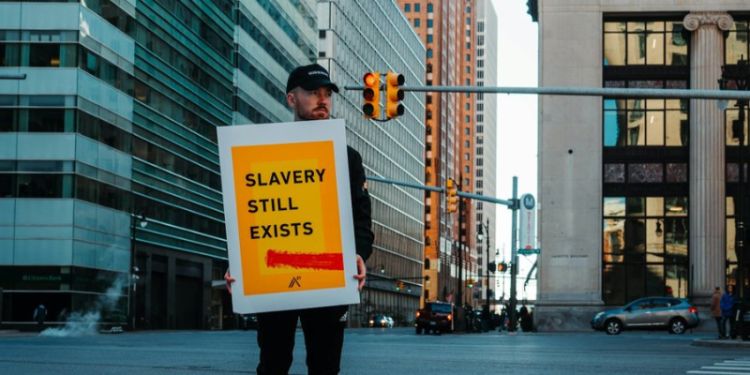Research on slavery and trafficking aims to understand, build awareness and protect victims

This Slavery and Human Trafficking Prevention Month, we highlight research at the University of Leeds that explores the causes and solutions to modern-day slavery and contributes towards ending it.
Modern slavery and human trafficking are global problems in which people are exploited for labour, services or their bodies.
According to the organisation Hope for Justice, “the number of people who are in human trafficking or living in modern-day slavery is estimated at 49.6 million”.
There are many reasons why victims cannot escape exploitation, from threats and violence to coercion and manipulation.
Policing and vulnerability
The Economic and Social Research Council (ESRC) Vulnerability and Policing Futures Research Centre examines how policing produces, exacerbates and tackles vulnerability.
The Centre explores problems in policing vulnerability including modern slavery, exploitation by county lines drug networks, online child sexual victimisation, domestic abuse and the policing of mental illness and homelessness.
Its modern slavery project investigates what a preventive approach to modern slavery would look like. It seeks to redefine what realistic outcomes in policing modern slavery might be for victims and police services.
Professor Adam Crawford and Dr Christine A Weirich at the School of Law collaborate with Professor David Gadd and Dr Rose Broad from the University of Manchester and Dr Tobias Kammersgaard from the University of York on the project.
A video explaining the centre’s work is available here: https://youtu.be/2KJkdXgF6KE.
Criminalisation of modern slavery
PhD researcher Colin Gregory studies the criminalisation of victims of human trafficking.
He previously worked within immigration detention centres across England and met many trafficking victims who had been through the criminal justice system and were facing deportation rather than protection.
Colin’s research is now focused on the statutory defence in England and Wales under the Modern Slavery Act 2015.
Cuckooing
Dr Laura Bainbridge is currently leading a N8 PRP funded project dedicated to understanding and preventing County Lines ‘cuckooing’ victimisation with Amy Loughery.
‘Cuckooing’ is a situation where drug dealers take over the homes of a resident to prepare, store and/or sell drugs.
Cuckooing is an exploitative and predatory practice, with estimates suggesting that more than one thousand individuals are victimised by cuckooing perpetrators each year.
As with other forms of modern slavery, victims are typically vulnerable and could include:
- drug and alcohol users
- sex workers
- the elderly
- single parents
- those with learning difficulties, disabilities and/or mental health issues.
The project investigates the mechanics of ‘cuckoo’ targeting including risk factors.
It will gain insight into the lived experience of ‘cuckoo’ victims and perpetrators and identify potential preventative measures for practical application.
Dr Bainbridge is the founder and chair of the Research England-funded Cuckooing Research and Prevention Network, whose first conference ‘Preventing and Disrupting Cuckooing Victimisation’ is this month.
Following the conference, Dr Bainbridge will be delivering a series of cuckooing awareness and prevention sessions with project partners including drug and alcohol workers, domestic abuse advisors and social workers.
The network aims to forge local, regional and national level policy and practice links, to transfer policy across police forces and public, private and voluntary sector organisations and to reduce citizen vulnerability to cuckooing victimisation.
The network will also co-produce a cuckooing risk identification tool with its partners and support them to implement it in the community.
Human organ trafficking
Dr Ana Manzano, Associate Professor of Public Policy at the School of Sociology and Social Policy, researches organ trafficking and human trafficking for the purpose of transplantation.
There are complex reasons why people sell and buy human organs and how global criminal networks benefit from this.
In the book chapter "Global Health Disparities and Trafficking of Human Beings for the Purpose of Organ Removal," Dr Manzano examines the relationships between human organ trafficking and intersectional issues such as:
- inequitable access to healthcare
- organ disease, particularly kidney
- wealth disparities
- national transplant systems
- ethnicity and gender differences in organ donation
- the impact of COVID-19.
She develops an understanding of the complex nature of human organ trafficking across the globe, which can be used to identify and support people who may be vulnerable.
Dr Manzano is the Chair of the Organ Trade and Trafficking group in the European Society for Organ Transplantation. She introduced the concept of ‘organ laundering,’ a term now widely utilised in the policy literature related to organ trade and transplantation abroad.
The role of faith-based organisations in anti-trafficking
University of Leeds researchers Professor Louise Waite, Professor Emma Tomalin collaborate with University of Sheffield researcher Dr Hannah Lewis to investigate faith actors and anti-trafficking.
Their most recent paper ‘Faith, bordering and modern slavery: a UK case study’ examines the landscape of human trafficking in the UK.
It shows that though faith actors and organisations offer a significant proportion of the support available to victims of modern slavery and human trafficking, there are structural limits to the help they can provide.
This is because of government legislation and policing around bordering and migration, which enforces a culture of disbelief and punishment when migrants make protection claims against modern slavery.
Asylum seekers and refugees’ experiences of forced labour
Professor Waite previously undertook a project called “Precarious lives: Asylum seekers and refugees' experiences of forced labour” with Dr Stuart Hodkinson.
They studied the experiences of forced labour among asylum seekers and refugees in England.
The research further highlights the contention between the UK government’s migration policies and its modern slavery initiatives.
The ‘hostile environment’ endangers migrants, making them more vulnerable to modern slavery and human trafficking.
Undocumented migrants may feel pressured to carry out deregulated work to survive as they are denied permission to work legally.
In addition, their precarious position can be used against them by abusers and could make getting help dangerous.
Modern slavery in the fashion and textile industry
As well as modern slavery in the UK, researchers at the University have explored the impacts of UK businesses on modern slavery across the world.
The project ‘Pulling a Thread: Unravelling the Trail of Modern Slavery in the Fashion and Textile Industry’ explored UK fashion companies’ relationships to suppliers in India and Vietnam.
In the fashion and textile industries, many companies contract others to create textiles and clothing.
As their supply chains can be long, public companies typically struggle to gain oversight of all those involved in the production of their products.
This limits their ability to see and maintain the safety and security of the people completing the work.
These weaknesses allow exploitation and modern slavery in the industry to continue.
The research project, by Professor Hinrich Voss, Professor Divya Singhal (Goa Institute of Management), Professor Louise Waite, Dr Mark Sumner and Dr Matthew Davis, explored how businesses and their suppliers and (sub)contractors can reduce the risk of modern slavery for workers in supply chains.
They found that UK businesses above the Modern Slavery Act threshold (£36m) had little incentive to comply with the Act. The study showed that the Act was not effective in changing overseas practices.
In their published paper, titled ‘International supply chains: compliance and engagement with the Modern Slavery Act’, the researchers argued that the Act needs to be more specific about what a supply chain is, what reporting standards are necessary and how the Act will be enforced.
They submitted written evidence to the House of Commons Home Affairs Committee Enquiry on the Modern Slavery Act in September 2018. Then, they submitted their research to the Environmental Audit Committee (EAC) in 2019.
Hidden stories from fashion supply chains
A continuation of this project challenges people to consider the unintended consequences of their consumption and to consider workers’ perspectives of modern slavery.
The project, titled ‘Cotton’s Hidden Voices: Stories from the makers of your clothes,’ is a collaborative project between the University of Leeds and the Goa Institute of Management. It’s funded by the Arts and Humanities Research Council.
It seeks to demystify the relationship between consumers of fashion and the 400 million workers in the fashion industry’s global supply chains.
To centre workers’ voices in the conversation about sustainable fashion, they have interviewed people working in fashion supply chains in India about their livelihoods.
The researchers have created seven short thematic videos out of the interviews, which can be seen in an exhibition at Clothworkers Building Central until 25th January 2024.
The videos are also available on the project website.
Cotton’s Hidden Voices illuminates the hidden connections between the creators and consumers of clothes and presents a different view of global supply chains, fast fashion and the people who work in it.
Contact Dr Mark Sumner via email for more information.
The breadth of the research at the University of Leeds shows how complex and varied the issues of modern slavery and human trafficking are. Our researchers’ essential work makes steps to encourage understanding and protection of victims, no matter where they’re from. It also explores how their situation can be improved, from government policies and policing to working with community organisations.




